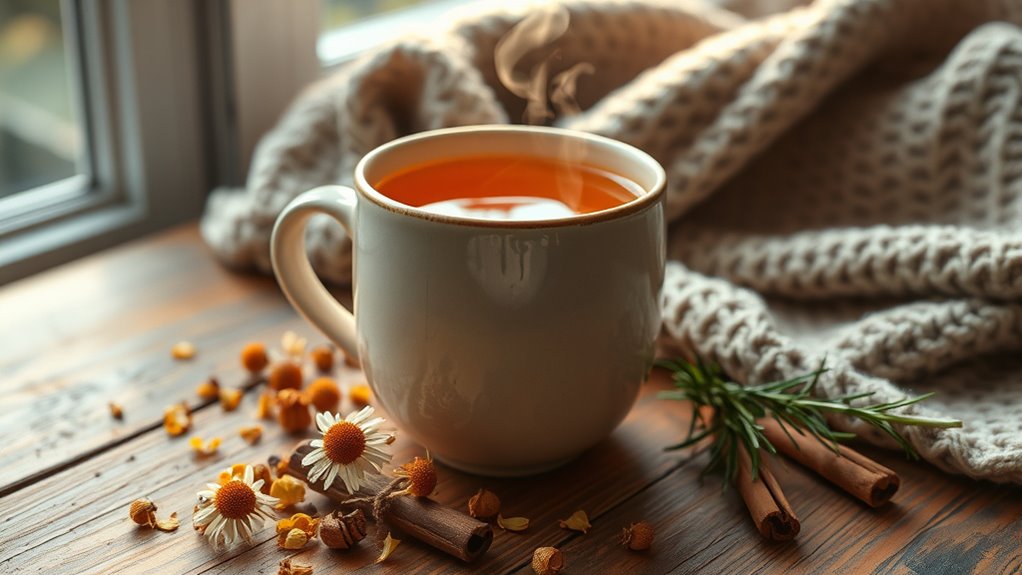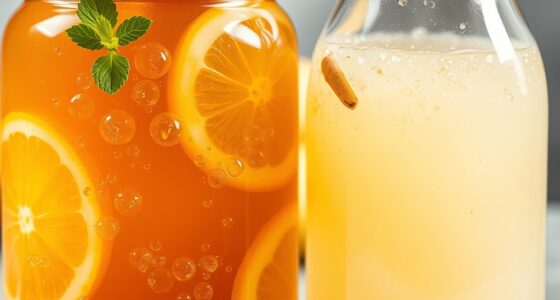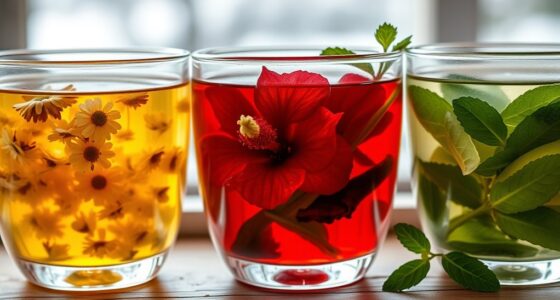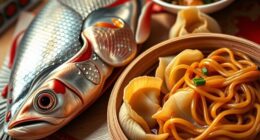To warm up your autumn, try herbal tea blends with seasonal spices like cinnamon, dried apple, and ginger, which offer comforting flavors and wellness benefits. Incorporate nutmeg, dried pear, or citrus accents like orange peel for extra brightness. These infusion ideas help support your immune system, soothe nerves, and create a cozy ritual during chilly days. Keep exploring how to craft personalized blends and elevate your autumn wellness journey with flavorful, aromatic teas.
Key Takeaways
- Incorporate seasonal spices like cinnamon, ginger, and nutmeg for warm, comforting flavors that evoke autumn’s essence.
- Blend dried apple, pear, or orange peel with herbs to create aromatic infusions that support immunity and relaxation.
- Add herbal accents such as rosemary or thyme to enhance flavor complexity and promote wellness.
- Use calming ingredients like dried pear and nutmeg for soothing blends that aid unwinding during chilly evenings.
- Customize with bright citrus or spicy star anise to elevate the sensory experience and reflect autumn’s bounty.

As autumn arrives, it’s the perfect time to cozy up with warm, comforting herbal tea blends that capture the season’s flavors. At this time of year, you can truly appreciate the richness of seasonal flavor combinations that evoke the essence of fall—think cinnamon, apple, clove, and hints of nuttiness. These flavors don’t just taste wonderful; they also help ground you, offering warmth against chilly days and nights. When exploring herbal infusion varieties, you’ll find a wide array of options designed to soothe, energize, or simply bring a sense of calm.
Embrace autumn with cozy herbal teas featuring cinnamon, apple, clove, and nutty flavors to soothe and ground you.
The beauty of herbal tea blends for autumn lies in their versatility. You can craft your own signature mixes or choose from well-loved options that celebrate the season. For example, combining dried apple pieces with cinnamon bark and ginger creates a cozy, spiced infusion that’s perfect for sipping on crisp mornings. Alternatively, a blend of chamomile with dried pear and a touch of nutmeg delivers a calming, aromatic experience ideal for winding down after a busy day. These herbal infusion varieties are not only flavorful but also packed with wellness benefits—antioxidants, anti-inflammatory properties, and soothing qualities that support your immune system during the colder months.
You might also enjoy experimenting with different herbs and spices to tailor your tea to your mood and needs. Add a dash of star anise or a few slices of fresh orange peel for a citrusy twist that brightens the palate. Or include a few sprigs of rosemary or thyme for a savory edge that enhances the herbal richness. The key is to embrace seasonal ingredients that reflect autumn’s bounty, creating a sensory experience that feels both indulgent and nourishing. Incorporating sound design techniques such as ambient sounds of rustling leaves or crackling fires can enhance your cozy tea moments and deepen your relaxation experience.
As you sip these warm herbal infusions, you’ll find that they can serve as a comforting ritual—something to look forward to during the busy fall season. Whether you prefer a mild, floral blend or a robust, spicy concoction, there’s an herbal tea for every moment. These blends can also be a wonderful way to incorporate healthful herbs into your daily routine, providing warmth and wellness with each cup. By exploring different herbal infusion varieties and seasonal flavor combinations, you make your autumn not only more flavorful but also more mindful and restorative. So, embrace the season’s harvest and let your tea time become a cherished part of your wellness journey.
Frequently Asked Questions
Can Herbal Teas Help Boost Immunity During Autumn?
Herbal teas can definitely help boost your immunity during autumn. They’re packed with herbal tea antioxidants that support your immune system and fight off seasonal bugs. By regularly sipping immune-boosting herbal remedies like echinacea or ginger tea, you strengthen your defenses naturally. Plus, the warm, comforting nature of these teas keeps you cozy and healthier as the weather changes, making them a perfect addition to your autumn wellness routine.
Are There Any Herbal Teas Suitable for Children?
Yes, you can find child-friendly infusions that are safe for children. Look for herbal teas specifically labeled as child-friendly and always prioritize herbal tea safety by consulting your pediatrician first. Opt for gentle herbs like chamomile, ginger, or lemon balm, which are usually safe in small amounts. Never give hot or overly concentrated teas, and always verify the tea is cool enough before serving your child.
How Long Should I Steep Herbal Tea for Optimal Flavor?
You should steep herbal tea for about 5 to 7 minutes to achieve ideal flavor extraction. Keep an eye on the steeping time because over-steeping can cause bitterness, while under-steeping might result in a weak flavor. Usually, a shorter steeping time releases the delicate flavors, so start with 5 minutes and adjust based on your taste preference. This way, you enjoy a perfectly flavorful cup every time.
Can Herbal Tea Replace Traditional Medicine for Cold Symptoms?
Herbal tea can’t magically cure your cold, no matter how soothing it feels! While herbal tea efficacy offers comfort and some relief, it shouldn’t replace traditional medicine for serious symptoms. Think of herbal remedies as gentle herbal medicine alternatives that support your recovery, not replace doctor-approved treatments. Rely on healthcare advice for severe symptoms, but enjoy herbal tea as a comforting, natural way to bolster your wellness during a cold.
Are There Any Herbal Teas to Avoid During Pregnancy?
You should avoid certain herbal teas during pregnancy to guarantee safety. Herbal tea safety varies, so always check ingredients. Steer clear of teas with herbs like sage, parsley, or hibiscus, which can trigger contractions or affect hormone levels. Follow pregnancy precautions by consulting your healthcare provider before drinking herbal teas. Opt for safe options like ginger or chamomile in moderation, but always prioritize professional advice to protect both you and your baby.
Conclusion
As you embrace autumn, crafting warming herbal tea blends can transform your daily routine into a cozy ritual. Imagine sipping a blend of cinnamon, chamomile, and ginger after a chilly day—like Sarah, who noticed her stress melting away and her immune system strengthening. By experimenting with these blends, you’ll not only stay warm but also nurture your well-being. So, why not create your own comforting cup and enjoy the season’s cozy magic?









